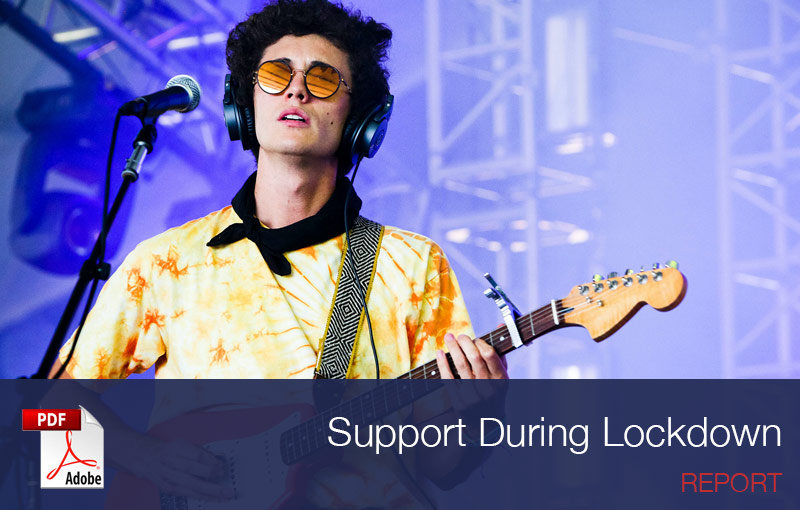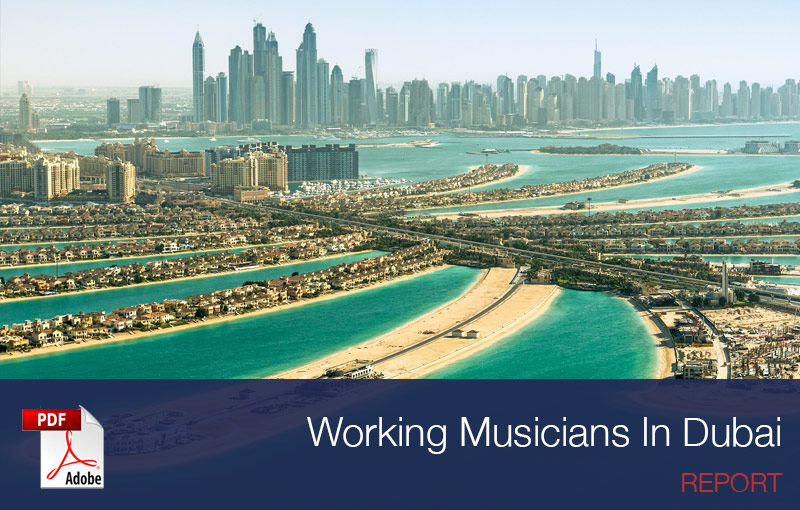Latest Industry Reports
Take a look at and read of some of our team’s latest reports into key industry issues..
Life as a Musician in Quarantine
Tom is a full-time musician based in the US and has been working with Artist Management Services for the best part of two years. He is primarily a pianist, but also enjoys the chance of putting his skills on the oboe to good use. Like the majority of us, Tom is currently trying make the best of life under lockdown. We caught up with him and asked him what it’s like for a working musician stuck in quarantine.
Hi, I’m Tom. I was born in Devon but moved out to the US six years ago to be with my (now) wife and to try and pursue my dream of working as a session musician. Long story short, it took less than a month since the move to land my first bit of work – playing piano on a recording for a children’s choir. It wasn’t exactly the rock and roll beginning I was expecting from a life in music, but I was grateful for the opportunity (and the cash, of course), and it actually led to some other exciting projects that I’m still involved with today. As well as session work, I also play regularly as part of the house band at a well-known Jazz club in town, and I also teach music one-to-one at my house.
As in the UK, after the outbreak of coronavirus in the States, the work for session musicians dried up very, very quickly. I was suddenly thrust into a very precarious situation; I suddenly went from making a comfortable living to having virtually nothing coming in the bank. When you’ve got a mortgage and a car to pay for, that is seriously scary. It wasn’t even like I could supplement my income with more teaching work. Lockdown made teaching all but impossible – or so I thought… (more on that later!)
Thankfully, my wife is a midwife, so we still had some money coming in, but that didn’t stop the worry or the feeling of uselessness I had. Friends suggested I take a second job in a supermarket, which I really strongly considered. To make matters more complicated, I’m severely asthmatic, so I had to take my health seriously too. In the end, I decided I would wait it out and hope that something – anything – would drop in my lap to keep me busy and make a little bit of money. After less than week into quarantine, I got a call from the owner of the studio where I get the vast majority of my work. He told me that the studio was being forced to close and it was very unlikely to ever open again. My heart sank. “Right,” I thought. “I really need to find a way to make some money…”
I was out in the back yard doing Pilates one Saturday (yes, I do that), when the mother of a boy I taught piano to called me out of the blue. She said that she was struggling to keep her son entertained with his school being closed and wondered if I’d consider giving him a lesson over video call. I was sceptical at first, as it wasn’t something I’d ever done before – and to be honest, I’m a bit of a technophobe. I agreed, wondering if there might be a way to resume my teaching after all.
Fast forward a fortnight, and I’m happy to say that things are great. I’m teaching fifteen pupils via Zoom (what a god send!), which is more than I was working with when lockdown was first introduced. Financially, I’m stable. Working with the guys from AMS, we found a few other ways I could make some extra cash and they also helped me to apply for a couple of grants which I was entitled to, which was super, super helpful. The really interesting thing to come from all this is the live streamed lessons I’ve started to put out daily via Facebook – entirely free for beginners. On average, I get around 200 watchers interested in getting started learning the piano. I get enquiries every day for formal lessons, making me feel a lot more comfortable about my financial situation going forward. All in all, I’m delighted with how things are working out for me right now. I’m grateful because I know how much people in my line of work are struggling because of all this craziness. To anyone reading this who feels they’re in a position similar to mine, I would really encourage you to get creative with how you might use your talents to fund yourself in new and exciting ways – don’t be like me and be put off by lack of technical know-how! Having a team like Artist Management Services on your side is also a huge bonus – I can’t thank Kev and the team enough for how they’ve helped me over the last month.
Thanks for reading and stay safe!
Female Acts On The Rise In The UK
20th April 2020 by Adam Cable
Signs are encouraging for aspiring female musicians, especially songwriters, as the number of women finding success in the industry is officially on the rise.
Although women remain massively outnumbered by their male colleagues, the number of female songwriters signing with UK rights organisation PRS for Music is thought to have increased by 60%, demonstrating the growing appetite amongst listeners for talented acts, regardless of gender.
PRS, which collects and distributes royalties to songwriters, said 1,755 women signed up in 2019, compared to 1,097 a year ago. Interestingly, nearly 63% were below the age of 30, perhaps indicating a trend towards younger acts.
Celebrated pop acts like Billie Eilish (18) and Mabel (24) have made headlines recently, for their musical contribution for the upcoming James Bond film and their well-received live performances at award nights respectively. Eilish is already steaming ahead in terms of the number of Spotify streams her most recent album has achieved so far this year.
Although improvements in gender equality have been made, there is still a feeling amongst industry experts that there is still a considerable way to go.
Director of membership at PRS, Claire Jarvis, said the recent statistics were “encouraging” but added that the number of women is still “dwarfed” by their male counterparts. Similarly, once female artists find some commercial success, it is thought that this is harder to sustain than it is for men: top 10 female songwriters generated 67% less revenue from royalties than the top 10 male performers.
Social media was rife with criticism for the Brit awards this year, where only one British woman, the aforementioned Mabel, featured in the mixed gender categories. With votes cast by a mixture of the public and industry expert panels, there was a distinct lack of equality in terms of how votes could be awarded: 86 male artists were up for selection, whereas there were only 26 women.
There remains a chasm of inequality between male and female songwriters, but if recent findings are anything to go by, it certainly seems as though there are reasons for young, aspiring musicians to be hopeful as they make their first tentative steps into an industry that is more richly diverse than ever before.
.
QuickFire Five: Interview With Miriam Price
3rd April 2020 by Ellie Dawson
We recently sat down with Miriam Price, a music graduate from Durham University, who is embarking on her first year working as a session musician.
What made you choose bass guitar?
My school was putting on a Christmas concert and nobody in the school played bass guitar. It seemed like a good way to avoid being given a cringey acting role which would involve me being on stage, so I volunteered on the basis that I could borrow a bass from school to learn. My older brother was a pretty accomplished guitar player – he actually signed a recording contract a few weeks ago – and he showed me the basics. The rest, as they say, is history.
What do you need to become a session musician?
An open mind is more important than any qualification or degree, in my opinion. Say yes to as many opportunities as possible while you find your feet. Also, being receptive to difference styles of music is going to prepare you for the different situations you’re likely to end up in. Lastly, it goes without saying that most employers are looking for you to be incredibly skilled at your instrument, so practise, practise, practise. Oh, and of course, there’s also an element of being in the right place at the right time.
As a woman, is it a challenge working in such a male-dominated industry?
Not at all. I can’t speak for all girls, but I’m very fortunate that 99% of the people I work with, male or female, are incredibly supportive and inclusive. Sort of like sport, music is a world where the attitude is very much, like, “If you’re good enough, we don’t care who you are or what you look like.” I just let my playing do the talking. That being said, I do think we need to do more to encourage young female musicians to take a stab at making a professional living out of music.
What is a typical working day for you?
It really depends. I’ve just finished a six-week tour of East Asia, which was just crazy, but so much fun. I’m having a few days to recuperate and get myself back on UK time before heading into the studio for a few days to perform on an album. The lifestyle is incredibly hectic and certainly isn’t for everyone, but personally, I absolutely love it.
If you could work with any artist, who would it be and why?
I’m going to get ripped to shreds for this, but I’m going to say Justin Bieber or another huge male solo performer like that. I’m not necessarily a fan, but I just think it would be so much fun to exist in that world, even if it was only for a short while. There’s a curious mysticism around acts like that – that are so popular and recognisable. I think it would be a very interesting experience!
Singing The Blues Away
30th March 2020 by Kevin Hollingworth
Musicians are finding quirky and creative ways to share their music with audiences amidst the disruption caused by the coronavirus outbreak.
When the coronavirus (COVID-19) started to make headlines in China, few could envisage the sort of social and economic impact it could have on the world in such a relatively short amount of time.
Nearly everybody has been personally affected by the disease, either in terms of theirs or their families’ health or their financial livelihoods. Indeed, the entertainment industry is one of the latest to have been hit hard by the crisis with consumer confidence at an all-time low.
Sadly, things are not expected to return to normal any time soon. Recent UK government announcements now mean that pubs, clubs and theatres are close to empty; it seems only a matter of time before these venues are forced to close their doors temporarily, or in some cases, maybe even for good. As a result, musicians and other performers have also had their financial security threatened.
But it’s not all doom and gloom. Musicians all over the world are finding creative solutions to their current lack of opportunities and are trying to make the best out of being self-quarantined.
Artists including John Legend, Bebe Rexha and The Dropkick Murphys have announced that they will be streaming concerts online for fans due to live performances being cancelled, and many others are looking to do the same. Other lesser-known musicians are also taking to social media to express their creativity away from their usual performance venues. Videos coming out of Italy show musicians holding impromptu concerts from their apartment balconies to try and provide entertainment for their neighbours who are in a state of quarantine.
As well as performers finding new ways and means to distribute their music, there has, in the last few days, been a dramatic surge in support for people working in the entertainment industry from members of the public on social media. Sponsorship sites like GoFundMe.com have seen a number of pages set up aimed at financially supporting musicians, actors, dancers and support staff who are struggling to make ends meet during this turbulent and uncertain time.
Phoebe Matheson, a singer-songwriter working with Artist Management Services, told us about the overwhelming support she has received since putting an appeal out on her social media accounts: “All of a sudden, I found all my upcoming shows being cancelled and my additional source of income (working part-time in a local studio) was forced to shut down. I had no other option than to turn to my following for help. The response was incredible. It’s heart-warming to know that even in these difficult times, people are willing to reach out and support the arts.”




